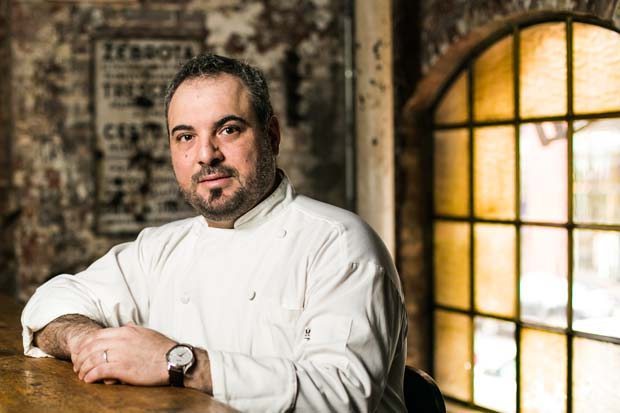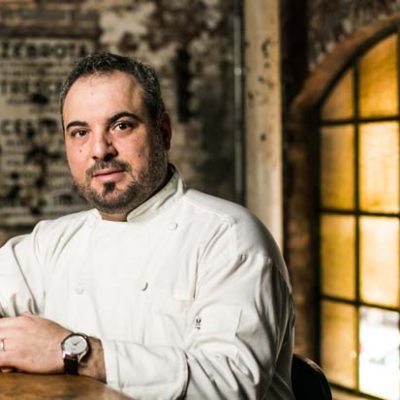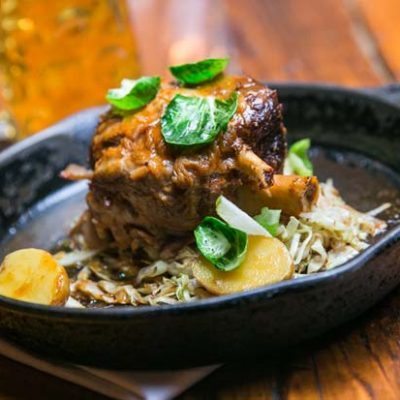
changing fortunes and flavors have only made this french-trained chef better, and bolder
by Meredith Napolitano Sternerphotos by alex Barreto
If opportunity comes to the prepared mind, then the best career move for Eric Francou, chef de cuisine of Radegast Hall and Biergarten, was being in the right place at the right time.
The French-born chef got his first job out of cooking school at age 20, when he walked into a small bistro in Lyon, seeking work, and the chef there happened to be very pregnant. Two days later, with time of the essence, the owner gave him the job. In another early career moment, he made the difficult leap from garde manger at the Michelin-starred Bruneau in Belgium to line cook, when a chef on the line sliced his finger and another cook shouted to him, “Jump in!”
Francou has always relied on an innate ability to make sudden moves, so when the opportunity to cook very good food at a big Brooklyn Biergarten arose, his curiosity was piqued…and he also saw it as a chance to have fun.
“The owners here are real foodies,” he said. “I liked the place, and took it as a challenge.”
Francou grew up in mountainous Grenoble, France, the only child of French-Italian parents, and cooking was a central part of family life. (“Sundays were huge. I’d help my father with the braciole,” he recalled.) His grandmother made pasta by hand, and rabbit stew and his mother’s lasagna are other memories.
Spending summers with family in Rome, he tagged along to work one day with his older cousin, a chef at a top hotel restaurant.
“I was maybe 8, and my cousin told me to sit on the pass,” he said, adding that something seemed to solidify there… ingesting the action of a restaurant kitchen and sampling dishes. “I still remember tasting the pasta.”
An avid tennis player, he considered playing professionally but scratched those plans, and at 17 told his parents he was going to cooking school, even though he was, as he explained, “already late.” (In France, apprentices often start at age 14.)
He enrolled in Lycee la Jacquiniere, learning basics, and after his stint at the Lyon bistro, was thirsty for advancement. When he was accepted to the prestigious Ecole des Arts Culinaires et de l’Hotellerie de Lyon, his parents took out a second mortgage on their house. There he studied under Master Chef Paul Bocuse, a relentless commander known for toughness.
“If you heard nothing from him, that was bad. If you did, you were worth his time,” explained Francou—describing an instructional approach that instilled in the young cook an ideology that there’s always further to go.
Ecole opened doors, first at Bruneau, where, prior to jumping on the line, he exchanged his services as a dishwasher for lodging, then slowly inched from potato-peeling to salad. The days were long, humbling, and found him stuffing bread into his pockets to nibble on. With a compulsory military conscription year on the horizon, he had to go back to France. In the army, he was met with a surprise: they asked him to cook. “But when I saw the food,” Francou recalled, “I sunk. It was degrading…frozen, horrible.”
He refused the assignment, and was briefly jailed for disobedience, until a colonel asked if he could make a cake for his granddaughter’s baptism. In a moment of enterprise, Francou suggested being a pastry chef for the colonels. Using better materials, he gathered other soldiers and ran a pastry kitchen. (An event that is, quite likely, the origin of his favorite kitchen phrase: “You can’t win a war without soldiers.”)
In 1998, Francou got the call for New York when an Ecole friend sought a sous chef for the now-closed Mad 28. Within six months he was promoted to executive chef. From there came opportunities in Long Island, but after the 2008 economic crisis, his partner pulled a critical investment. Francou lived nomadically for a period, then realized he only had one choice: back to the city.
There was a stint at Frederick’s Madison, teaching classes and consulting on-site for a restaurant group opening in Azerbaijan. “That was culture shock,” he said, and was happy to return to New York.
When, in 2011 he was offered to do a tasting at Radegast Hall, he thought he’d consult there, too, and quickly saw that he could tighten the ship. Knowing customers would come for sausage, not fish, Francou revamped the kitchen and upgraded the five-item menu. He added more spice to the Hungarian beef goulash and made the veal schnitzel crispier. The grilled, smoked pork chop, another staple, got seasonal stuffings, and Francou now gets to play with more complex flavors in the braised short ribs and small Ribeye, and classic ones in the steak tartare.
“Still, I have to know where I am,” the chef explained. “Everything on the menu has to have a purpose.” The sausages, ordered at the grill in the back and served with mustards and krauts, are a real draw. I asked him if they are made in house, and his head dropped a little.
When Francou saw the state of military food, he refused to cook it, and was briefly jailed for disobedience until a colonel asked if he could make a cake for his granddaughter’s baptism.
“I tried,” he said, “but we simply sell too many. I saw quickly that I would spend my whole life making sausage, instead of all the other dishes.” Similarly, he realized making the large, soft pretzels on the premises would be a business error. “We have a very, very high-quality source for both of them now.” From chicken and tomato sausage to Argentinian beef to pork, he customizes the blends with their purveyor.
All this makes Radegast an unexpected chapter for a talent whose inspiration is constantly multiplying. Currently, he juggles the restaurant with Brasserie Whitlof (opened last fall around the corner), where the focus is Belgian comfort food.
And what about those Michelin-starred restaurants he worked at? He likens Michelins to Oscars. “I know it can be tricky,” he said, citing chefs who have actually taken their lives over ratings, and believes he never got sucked into destructive patterns because of those early days in school and military.
“You need a foundation,” is his mantra. Still, Francou has another, more simple motive: the desire to please. “I’m not the chef who goes out there and talks and asks about everything,” he said. “But when a person sees me near the kitchen and tells me something was the best…that’s priceless.”





